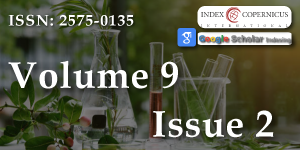Obtaining Synthetic Polyploid Sources through Hybridization of Diploid Species of Gossypium L. and Their Cytological Analysis
Main Article Content
Abstract
The wild diploid species Gossypium anomalum is considered a promising genetic resource for improving the genetic traits of cultivated cotton varieties due to its natural adaptation to abiotic (e.g., drought, high temperatures) and biotic (e.g., insects, diseases) stress conditions. Due to the challenges in hybridizing cultivated tetraploid and wild diploid species, the genome of the F1 generation, obtained from the hybridization of wild species G. herbaceum subsp. pseudoarboreum (A1 genome) and Gossypium anomalum (B1 genome), was amplified through synthetic polyploidy to restore crossbreeding fertility. Cytogenetic analysis of F1С hybrids revealed unbalanced tetrads and abnormal dyads during sporogenesis. These anomalies, resulting from genetic differences between the species, negatively impacted the fertility of the hybrids. Additionally, disturbances in chromosome distribution during microsporogenesis were observed, leading to reduced viability of pollen grains in hybrid plants. Based on these findings, it was concluded that further breeding efforts are necessary to enhance the genetic stability and restore the fertility of these hybrids.
Article Details
Copyright (c) 2025 Xolova M.

This work is licensed under a Creative Commons Attribution 4.0 International License.
De Storme N, Geelen D. High temperatures alter cross-over distribution and induce male meiotic restitution in Arabidopsis thaliana. Commun Biol. 2020;3(1):187. Available from: https://doi.org/10.1038/s42003-020-0897-1
Lei X, Ning Y, Eid Elesawi I, Yang K, Chen C, Wang C, Liu B. Heat stress interferes with chromosome segregation and cytokinesis during male meiosis in Arabidopsis thaliana. Plant Signal Behav. 2020;15(5):1746985. Available from: https://doi.org/10.1080/15592324.2020.1746985
Yeung EC, Oinam GS, Yeung SS, Harry I. Anther, pollen and tapetum development in safflower, Carthamus tinctorius L. Sex Plant Reprod. 2011;24(4):307–317. Available from: https://doi.org/10.1007/s00497-011-0168-x
Kaur K, Gupta RC, Kumari S. Cyto-morphological studies of some dicot plants from Rajasthan (India). Cytologia. 2015;80:353–362. Available from: http://dx.doi.org/10.1508/cytologia.80.353
Russo G, Krauss M. Septin remodeling during mammalian cytokinesis. Front Cell Dev Biol. 2021;9:768309. Available from: https://doi.org/10.3389/fcell.2021.768309
Jäger K, Fábián A, Barnabás B. Effect of water deficit and elevated temperature on pollen development of drought sensitive and tolerant winter wheat (Triticum aestivum L.) genotypes. Acta Biol Szeged. 2008;52:67–71. Available from: https://abs.bibl.u-szeged.hu/index.php/abs/article/view/2583
Pausheva ZP. Practical training in plant sitology. Method. Manual. Moscow: Agropromizdat; 1980.

